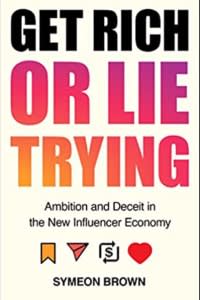An online influencer is someone with a large social media following who uses their internet celebrity — or “clout”, in the parlance — to make money. This usually involves advertising a product or service. It’s essentially a kind of outsourced marketing, but for many in the Gen Z cohort the work holds a glamour akin to pop stardom.
Conservative estimates suggest there are upwards of 3.5mn people engaged in such activity; according to the German data firm Statista, the influencer market was worth $13.8bn in 2021. In Get Rich or Lie Trying, Symeon Brown takes a critical look at this and other forms of online “hustle”.
The US clothing retailer Fashion Nova cultivates a legion of “micro-famous brand ambassadors” — photogenic women who receive free clothes in return for modelling them on their Instagram accounts. The Istanbul-based surgery provider Clinichub deploys a similar strategy, offering free implants to some women in return for enthusiastic social media posts. These Instagrammers, Brown writes, are “providing the company with free labour as promo girls, giving the brand edited adverts they did not have to pay for”.
Another type of internet celebrity earns an income by performing on a freelance basis for online streaming platforms that generate revenue through advertising. Brown travels to Los Angeles and interviews a Cameroonian migrant who starred on the now-defunct Cx Network, a popular live-streaming platform where American users paid to racially abuse him. He maintains: “I’d still rather do this than work a 9-5 somewhere.”
A woman who went viral after performing a sex act on a robot on the same platform is similarly sanguine about the online abuse she subsequently received: “If you don’t have haters you ain’t poppin’.”
This blithe “can do” spirit is a recurring theme in the pages of Brown’s book. It can all too easily lapse into delusion. One of Brown’s interviewees, a self-styled marketing influencer who has achieved negligible success despite many years of striving, invokes Malcolm Gladwell’s theory that one becomes an expert in a given field by clocking up 10,000 hours’ experience, remarking — without irony — that she has frittered away almost that many hours in her endeavours and is therefore “getting close to expert status”. The pathos is gut-wrenching.
The author reserves particular scorn for influencers who, as he sees it, have piggybacked on good causes for their own ends. He is withering about Chidera Eggerue, who rose to prominence through her #SaggyBoobsMatter body-positivity campaign before embarking on a career as a motivational speaker, peddling an “incoherent mix of . . . gender conservatism, professional narcissism, consumerism and hyper-individualism wrapped in feminist packaging”; “in faking or forcing expertise she does not have, Chidera embodies the emptiness of the social media economy.”
Elsewhere in the book, Brown interviews aspiring traders who were hoodwinked into joining pyramid schemes, and a woman who sells racy photos of herself via the OnlyFans website. In truth, these various economic actors — the Instagram celebrity, the self-help guru, the wannabe trader and the digital sex worker — have relatively little in common other than having been enabled by the internet. Strictly speaking, they are disparate phenomena.
Brown is a reporter with Channel 4 News and the register here is indeed reminiscent of a TV news exposé. His interview-centric approach, which foregrounds human stories over statistics, yields some telling psychological insights into the hopes and aspirations of wannabe influencers: they are united, above all, by an intense desire to get ahead in a world of limited opportunities. It’s a shame, however, that the all-important monetary dimension is only lightly adumbrated. A thoroughgoing deep dive into the economics of the influencer industry remains overdue.
Get Rich or Lie Trying: Ambition and Deceit in the New Influencer Economy by Symeon Brown, Atlantic Books, £16.99, 304 pages
Join our online book group on Facebook at FT Books Café











